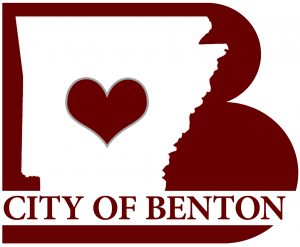The City of Benton Streets and Stormwater Committee will discuss a funding for a connector street, and accepting a neighborhood. They will also hear project updates from McClelland Engineering.
This meeting is open to the public. It will begin on August 15, 2023 immediately following the Benton Parks Meeting. It will be held in Council Chambers in the Benton Municipal Complex.
Agenda August 15, 2023 meeting:
Committee Members: Jeff Hamm, Chair; Frank Baptist; Shane Knight; Jeff Morrow; Steve Brown; John Richey, Streets and Drainage Director
Military Road Connector Street-A resolution expressing the willingness of the city of Benton, Arkansas, to utilize Federal-Aid Transportation Program funds Surface Transportation Block Grant and Carbon Reduction Program.
Accepting Streets, Utilities and Stormwater Drainage Northshore Ridge
McClelland Engineering Project updates
Meeting Minutes Transcript from July 11, 2023 meeting:
Alderman Hamm-I call this meeting to order. We will start with recognition of attendees beginning with me and moving to my right. I’m Jeff Hamm, Chairman of this committee. Shane Knight, Judd Hart, Jeff Morrow, John Richey, Tom Farmer, Bill Donnor, Eveyln Reed, Steve Brown, Frank Baptist.
Jeff Hamm-Thank you, ladies and gentlemen, and we do have a quorum so, we’ll move to item three, is the approval of the Minutes, and I hope that everyone has had a chance to review them,
Judd Hart-Motion to approve.
Shane Knight– second.
Jeff Hamm– We have a motion and 2nd to approve the Minutes of the June 13th meeting all in favor, aye. Opposed motion carries. Item number 4. Is the acceptance of the Salt Creek Estates, streets and utilities that will be coming up at the Council Meeting in a couple weeks. Everybody, anybody got anything to report about that other Mr. Richey and I’ll call upon Mr. Richey, at this time to visit with William or
Tom Farmer– I think William’s got a statement he’d like to offer, because he’s the street inspector, was at the time so turn your microphone on.
William Townsend-Thank you. When they were built, they were built to the specifications at that time. A year later, we made a punch list or 10 months later we made a punch list, and they made the repairs
Judd Hart– Is the developer here tonight? Was it just the cost thing because that that’s in my that’s in my ward, I’ve driven by there a few times and it, man, looks like it could erode. There’s some erosion there. I mean, was just the cost, a matter of cost consideration as to why we didn’t put in gutters or curb? What if we had curb and gutters? Come up to the microphone please you.
Gary Kennedy-Kennedy Development homes. There was a couple of reasons for it. One, it would if we had curb and gutter, sidewalks didn’t meet ADA, so we couldn’t have sidewalks and then we just have curb, at which point I’m from Germantown, TN outside of Memphis, at these neighborhoods are all over the place. The nicer neighborhoods are actually built this way, so I came to the city, I kind of described what I was trying to achieve with the states out a lot. No curb and gutter, but it is down larger lots and more natural room between your neighbors and that was the idea. That’s what was approved and that’s what we were calling for. Was just what I was used to growing up.
Judd Hart-I was just. I just. I didn’t have all the background context of that but a, but if there is a major flood or rain event, I mean you’ve got mechanisms in place with ponds or ponds is that?
Gary Kennedy-We do have a detention pond. It filters out on into Salt Creek.
Judd Hart-I guess I have one question that when the how long has it been since the streets, you met the compliance of that?
Gary Kennedy-4 plus years.
Judd Hart-And is it traditional because there’s some that you’ve had some issues? In those four years and when after we should have accepted, is that, is that normal based on the way in which it was put together? Or is that because of some other circumstance?
Gary Kennedy-My experience though, I’ve never had anything go that way. So, after a year of the streets being in use, you get a punch list from the streets department. And we fulfilled and inspected. The proof we were we were approved. In every inspection, all the way of the construction. And then we had a year of usage and then we had it. It was about a year and a half. We had the inspection. The punch list you created, we completed everything on the punch list. It was approved. What I didn’t realize is it came here, and it was tabled. That’s my fault. I guess we’re not realizing that I didn’t find that out for maybe a year, and once I figured that out, we wanted to come back and see what happened.
Judd Hart– I guess my question is what is the current cause of some of the erosion that’s going on, but again, the city is gonna assume responsibility for that. And I’m gonna vote yes that you’re relieved of it, but then? What is? You don’t see that kind of erosion, I don’t believe in streets that are four years old or something.
Gary Kennedy– Are we talking about the sides?
Judd Hart-Yes. Yeah, on the sides.
Gary Kennedy-Go back to the beginning. We just wanted to build the roads the same way we build them in the county which is two and a half feet of gravel on each side of the asphalt. However, if you notice the roads over there extremely wide. It was requested that we build them all the way to the edge of the gravel. Sam Johnson, myself and the engineer, a number of people argued the point kind of said we thought it wouldn’t do as well that way. Now to be fair. The Highway Department expert I just say that expect the roads that they have held up, they’re at 90. I believe it’s 91.1% good or fair after close to five years. Which the road, the road has a ten year lifespan for before it has to be repaved, which is actually 91.1% quite good after five years. So it’s done well. It just wasn’t the way we had originally intended to do it.
Tom Farmer-We actually hired an independent firm to come out here.
Shane Knight-So, Mr. Chairman, if I hear the narrative correctly. At the time. That this, this the streets of this subdivision were being constructed, they were constructed according to current codes, that was on the books. Punch List was created under same current code. Once everything was accepted, code changed based upon some discoveries. Now we have new code, but everything in this subdivision was adopted by this City.
Jeff Hamm-That’s correct.
Tom Farmer-Mr. Kennedy I think I do have a question and I think that this Council wanted understand that 10% of the roads were in poor conditions. So Mr. Kennedy took it upon himself to offer to pay 10% of what the total cost of repaving the road you know about $7000, is that correct against?
Gary Kennedy-The straight marks they came in at 91 percent, 91. .1% good repair. So I said I would make up the difference of the 8.9%. After five years, you use just to, goodwill with the city. So that’s. But it’s like 6700 something dollars.
Jeff Hamm-Yes, Mr. Donnor.
Bill Donnor-I drove through yesterday and counted 12 patches in the pavement far, and two places that needed patched. In five years, we had, more than 10% failure of the patches that you have put in.
Gary Kennedy– So those patches were required as part of our punch list. After these what happens is, the road is intended to last for 10 years however, the 1st 10 years, the hardest years obviously or the 1st two or three years are the hardest years on the road, that’s when the house construction is going on and that’s when you have dump trucks, concrete trucks, everything fully loaded, heavy equipment coming through there and that’s where the road said to be meeting that they’re gonna have the residential neighborhood. It’s not. Not I-30. It’s just, it’s a residential neighborhood with a little bit of traffic. So the streets department, at the end of every neighborhood gives you a punch list of patches and it’s mostly for heavy equipment. So that’s what those patches are.
Bill Donnor– I live in Miller Cove. It was built in 1990. Larry Black built that community and he put curb and gutters and it wasn’t necessary code. He just did it to maintain our streets. Our streets have stayed maintained 1990 til now. The curb and gutter really do help keep the water from underneath the pavement, causing it to bust and freeze as you know. If you don’t repave it water is gonna get under it sooner or later and it’s gonna bust again.
Shane Knight-But you built it to code.
John Richey-I’d like to add to what you’re saying. That’s why we have changed the rules to have what we have now just in city of Benton. Now, so thanks to the Council, we got that taken care of so we don’t have that issue anymore, just so we don’t have to worry about that.
Tom Farmer-We also increase the depth of the gravel and the depth of the asphalt now for our roads we went in line with what the county does.
John Richey– that’s exactly it.
Judd Hart-Well, I’ll. I’ll make a motion to accept the maintenance of the streets. Steve Lee-second.
Jeff Hamm-Motions been made, seconds been made. Is there any further discussion? Hearing none, we’ll take a vote. All in favor? Aye. Opposed? Motion carries. We will bring it forward to the Council. Ladies and gentlemen. We’ll move on to and at the time we’ll move on to item 5, the low bid on the backhoe and I’ll turn it over to Mr. Richey for that response.
John Richey-Yeah, this is a resolution accepting the lowest acceptable bid, for Street department backhoe from J A Riggs Tractor company in the amount of $174,278.13.
Jeff Morrow-How much? How much was our last backhoe purchase?
John Richey-Aspect that was a little over a hundred thousand to the best of my knowledge, maybe like a hundred twenty.
Jeff Morrow-I mean like what year?
John Richey-2016
Judd Hart-How many backhoes does that give us now?
John Richey-We still have 3. One is, we probably feel like it’s falling off we did put some money into it recently. But we feel like it’s on its last leg.
Jeff Hamm-Motion has been made to 2nd. Any other further discussion? Take a vote. All in favor, aye. Opposed? Motion carries. We will bring it forth to the Council in two weeks. #7 on the list is resolution number six. Yes, you’re #6. It’s resolution to for the low bid of storm sewer, rehab project and Mr. Richey won’t you address that.
John Richey-This is a rehabilitation project, low bid for a resolution for rehab that we need desperately done over between Lynnwood and Cedarhurst. Just a real soft, wet area, will never dry up. Can’t get in there with any equipment. This method of fixing it, inner wound method, where they go in and just take it from the middle and line it with plastic or plastic pipe. And they’ll go from one end to the other and seal it up first, and then they make this a whole lot better situation. No, no excavation to this method. And me and William had the opportunity to go to Hot Springs and watch this method he performed. This is ideal spot. Save a lot of money and save a lot of property, won’t be tearing up property.
Judd Hart– So it’s on the ground.
John Richey-In the ground in the ground.
Tom Farmer– In the existing culvert, they spin this other plastic pipe inside the existing culvert instead of digging it up and replacing it.
Judd Hart-What’s the location again, John?
John Richey-Between Lynnwood and Cedarhurst in the back.
Jeff Morrow-I know where that is. I used to live there.
William Townsend-They can have it done within a day.
Shane Knight– Mr. Chairman make a motion to approve.
Judd Hart-Second
Jeff Hamm– motion to approve and it’s been seconded any of the further discussion.
Steve Brown-Just one question Mr. Chairman Mr. Brown Mr. Richey sounds like this is newer, newer technology that they’re doing that has one of the studies on your ability for plastic pipes is there an idea of life cycle for that.
William Townsend-They originally come up with this for sanitary sewer and it’s PDC. That’s real thick. They’ve found it in sanitary sewer for a while. It meets ARdot standards. But they’ve already got with ARdot, got it approved and everything so. As far as telling you the longevity of it, I can’t but. ARdot approved it, so it’s going to be fairly decent.
Steve Brown-So they’re basically, they’re just extending the use of it beyond the sanitary sewer out to other. OK, that helps. Thank you.
Jeff Hamm-Any other further discussion or questions? Hearing none. We have a motion and a second on the floor. All in favor? Aye, opposed. Hearing none. Motion carries. Now I have said this rectify a misunderstanding of the method of stabilization. And I’m not going to go into it any further than that. Other than if you want to visit with Mr. Richey about it, you can afterwards. I just want to let you know he’s lost a lot of sleep over it. And we know he’s trying to do the right thing so. Yeah, I think it’s the simple facts and the simple remedy. What’s known as misunderstanding? Does anybody have any discussion I believe he’s talked with everyone. Any further questions.
Jeff Morrow-Mr. Chairman, motion to approve.
Shane Knight-Second.
Jeff Hamm-We have a motion to approve and the 2nd. Any other further discussion? Hearing none. All in favor? Aye, opposed motion carries. #8 on the list is an update on the Benton Overlay Project which you’ve seen going on. Seems to be moving quite well and at this time I’ll turn it over to Mr. Richey to answer any further questions.
John Richey-OK, I just want to give you an update on the overlays that’s going on and has been going on for the last couple of weeks. They started out with the state project on Border St., Montclair and Princeton, and they’ve wrapped that up. I don’t think it’s Day 4 yet, but It’s wrapped up on their part what to do. And then they moved over to Alcoa, on Old Highway 88 that runs out from Military to the Parkway and that has been repaved. That was, that’s the state job ARdot job. Then they moved over to our project, the City’s Project on Military from, say, McDonald’s to Burger King. And they finished that. They have to still do the striping. Square that part up, get all that taken care of. And then as of last night, I think they started on the state portion of Military and probably get that complete within a week or so, there on that part. Then they’re going to move over to either, I think it’s going to be East Street, what I’m hearing which is out here in front of the municipal complex and then Carpenter. And so. It really feels a lot nicer to drive on these streets. It’s been rough for so long. Get it all done at one time like this.
Judd Hart-That’s the ARDot part. The city’s part is like isn’t it like an 80/20 share on military? Don’t we have part of that were gonna be city?
John Richey-In the city, no, the Military part is done from McDonald’s to Burger King is all on the city. The part that is on Border Street is a state aid we have to participate up to 10%, which we did go over that amount on the just because of the size of the job it is but this is the third, one of the state aid projects that we’ve got in the last 10 years, so.
Judd Hart-What’s gonna give us some property or something? Or there was an agreement made right, mayor with the State?
Tom Farmer-That was movement of exit 117. That they were gonna, if we would accept after they repaved their end of military, then they would move exit 117.
Judd Hart-I did have one question. So the stripes on there that are currently, I know they’re they’re not solid, but the middle lane to me seems very narrow on that. And they’re gonna leave that?
John Richey– they are temporary.
Steve Brown-Thank you, Mr. Chairman, John, a question about the work that we’re doing on, on military. I know you guys a couple of years ago went to some great effort to raise a lot of the manhole covers and stuff to get them to where they were. I’m assuming you’re going to do that again to get them up to where the new height is?
John Richey– That’s Correct. I actually talked Wastewater today about helping us again with that so. We’re going to try to come up with some ideas to make this without a big expense. You know, work with what they did before that big expense.
Jeff Hamm-Any other further questions? There’s one other resolution that’s going to come about and it’s simply a resolution applying for grant for West Cross Street and if anybody objects to accepting money, or grant to help.
Judd Hart-What’s the 20% match here? What’s what? What is the criteria for the 20% match?
John Richey-This is for a grant for Cross Street. We got McClellan working on filling that out for us. Your method plan, it’s going to be a 20% match.
Shane Knight– right? What is it? Cash is in labor is in materials is.
John Richey-In cash.
Jeff Hamm-Any further questions?
Shane Knight motion to accept.
Judd Hart-Second, all in favor? Aye, opposed.
Jeff Hamm-Before we close adjourned. This meeting I would like to say that I want to commend. Yes, Sir, Mr. Mayor?
Tom Farmer-John’s got one more.
John Richey-OK, we have another grant we’re applying for also at this time through Garver and it’s just a, it’s just to ask for more money for a grant we already got for the Southwest Trail. We were advised to go ahead and apply for more money for that. Because it got a little bit more expensive since last time. I don’t, I don’t have to go out for resolution cause, Casey said that we could just use our last Resolution that we had for the first one to apply for the grant. Now a different grant would be a different story.
John Richey– for 1.5 million, extra on top of the. 1.2, I think we got 1.3. So just want ya’ll to be aware of that.
Jeff Morrow-That’s just for the Southwest Trail?
John Richey-Just for the Southwest Trail. From the bridge of the river to Market Street. Most of that comes because they’re going to have to build a bridge across Depot Creek and it was quite expensive.
Shane Knight-What they’re gonna do is they’re gonna take your current grant application and just extend that same language and everything that was in that current grant application. To this extra money. That’s my opinion. That’s correct.
Jeff Hamm-I don’t believe anybody on this Council would object to accepting more money? Yeah, exactly. Now I’d like. To say before we adjourn, is there anything else? I just want to commend John and his department on putting together a list, such as what we have in the packet was updates. Basically every month. For those that pay attention to, it gives an idea as to what. If somebody mentioned something, you can look on this list and see it as mentioned. And I want to thank John and if y’all get the chance, I would hope you thank John and William and Tanya for putting all this stuff together. If you see his crews on the street, thank them and smile when you’re done. That’s all I have. Anybody got anything else? I call this meeting adjourned.
For more events visit www.mysaline.com/events.





